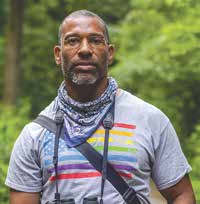
By John Lewis and Stuart Gaffney–
“Hatred never ceases through hatred. Only by not-hating does it end.” So reads an enigmatic 2,000-year-old Indian Buddhist text. As LGBTIQ Pride month begins, we find ourselves taking pride in the fact that a gay African American man’s forceful yet considered response to a completely unprovoked act of racism against him provides us an opportunity to see how this ancient adage can still apply in today’s tumultuous times.
As millions around the world are now aware, Christian Cooper, an acclaimed “pioneer of queer representation in comics,” was enjoying birdwatching in a part of New York’s Central Park where dogs must be leashed to protect bird habitat. After Cooper asked a dog owner to put a leash on her dog, he began filming what ensued on his phone.
The dog owner first started to come at Cooper to grab his phone, and he firmly but politely told her: “Please don’t come close to me.” Perhaps disarmed by Cooper’s clarity and equanimity, the dog owner attempted, in Cooper’s words, “to get an edge in [the] situation,” threatening to call 911 and falsely “tell them there’s an African-American man threatening my life.” She soon did just that and launched into histrionics to the 911 operator: “There’s a man, an African-American man. He is recording me and threatening me and my dog.” She implored the operator: “Please send the cops immediately!”
In an interview with The View, Cooper explained that he began filming the dog owner, because he and many other birdwatchers had been documenting incidents of dog owners failing to abide by park rules designed to protect wildlife. The city itself had done very little to enforce the rules.
Cooper described the dog walker’s fabrication that he as a black man was about to attack her as a racist act, and “I decided consciously that I was not going to participate in my own dehumanization.” He later told The New York Times: “There are certain dark societal impulses that she, as a white woman facing in a conflict with a black man, that she thought she could marshal to her advantage.”

This same sense of power and entitlement perhaps led Minneapolis police officer Derek Chauvin to think he could jam his knee into a handcuffed George Floyd’s neck to the point of asphyxiation, or gave Travis and Gregory McMichael the idea they could gun down Ahmaud Arbery as he was innocently jogging down the street.
But Cooper has also spoken out against reported death threats the dog owner has now received, telling CNN they were “wholly inappropriate and abhorrent and should stop immediately.” He reflected: “I find it strange that people who were upset … that she tried to bring death by cop down on my head would then turn around and try to put death threats on her head. Where is the logic in that? Where does that make any kind of sense?”
Can hatred cease by more hatred?
Significantly, Cooper has resisted invitations to up the ante and brand the dog owner herself a “racist,” saying “only she can answer that.” And Cooper believes she will do so by “how she conducts herself” in the future and how “she chooses to reflect on this situation and examine it.” Could Cooper’s “not hating” the dog owner enable her to be less defensive and reflect more deeply on her actions?
Cooper is interested in quelling racist impulses and stopping racist acts—not vilifying the dog owner as a person. He said that “it’s not really about her … . It’s about the underlying current of racism … that has been going on for centuries.”
Cooper’s heart is even big enough to feel compassion for the dog owner as she faces what he terms a “tidal wave” of public criticism. “[I]t’s got to hurt … . I’m not excusing the racism, but I don’t know if her life needed to be torn apart.”
Cooper also holds the dog owner responsible for her actions. If “this painful process … takes us a step further toward addressing the underlying racial, horrible assumptions that we African-Americans have to deal with … then it’s worth it.”
A less reported detail of the incident is the fact that Cooper was actually in the process of offering the dog a treat when the dog owner began to escalate things. Does Cooper’s decision to act with kindness and not hate from the beginning reflect a type of queer sensibility? How does “not hating” influence our actions and those of others? Answering these questions may guide us as we begin Pride month and as our nation searches for a way forward.
John Lewis and Stuart Gaffney, together for over three decades, were plaintiffs in the California case for equal marriage rights decided by the California Supreme Court in 2008. Their leadership in the grassroots organization Marriage Equality USA contributed in 2015 to making same-sex marriage legal nationwide.
Published on June 11, 2020
Recent Comments